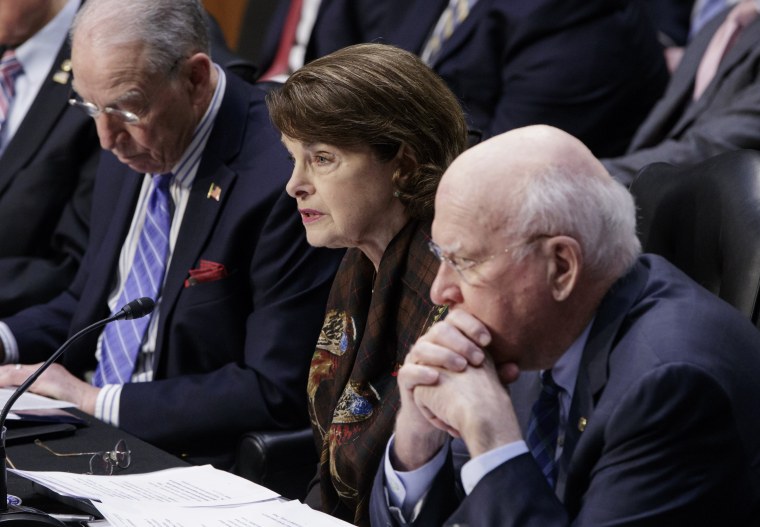The Senate Judiciary Committee Monday voted along party lines to advance Supreme Court nominee Neil Gorsuch out of committee, pushing his nomination to the Senate floor where a filibuster now awaits.
Earlier in the day, Senate Democrats gained enough votes to block the nomination on the floor, a move that appears certain to lead Republicans to change Senate rules and allow Gorsuch to be confirmed with a simple majority of 51 votes, instead of the current 60-vote threshold.
Four Democrats announced their opposition to Gorsuch Monday morning, including three on the Senate Judiciary Committee who spent the morning debating his nomination.
Related: What the Nuclear Option Is and Why It Matters
Senate Majority Leader Mitch McConnell Sunday indicated that he will proceed with the co-called "nuclear option" to change Senate rules and avoid a filibuster.
"Neil Gorsuch will be confirmed this week. How that happens will really depend on what will happen with our Democratic friends," said McConnell on NBC's "Meet the Press" on Sunday. Republicans currently hold 52 seats in the Senate.
Sen. Dianne Feinstein, D-Calif. and the top Democrat on the Senate Judiciary Committee, announced during this morning's hearing that she "cannot support this nomination." Her spokesman confirmed Monday that she will support a filibuster.
"Judge Gorsuch’s views were difficult to discern because he refused to answer many questions — even basic questions that were answered by previous nominees," Feinstein said.
Her announcement, along with similar announcements from several of her colleagues, gave Democrats the 41 votes they needed to filibuster the nomination.
All eleven Republicans on the Judiciary Committee emerged from their meeting united, holding a news conference denouncing Democrats who they say can't come to terms with Trump's electoral victory in November.
"Our Democratic colleagues cannot accept the fact that President Trump won," said Sen. Lindsey Graham, R-S.C. "Well, he did."
In the last hour on the Senate floor, Minority Leader Chuck Schumer noted that having enough Democrats to filibuster Judge Neil Gorsuch is just more evidence that the nominee should be changed.
Related: These Are the Democrats Voting Against Neil Gorsuch
Republican members will have to vote to actively implement the "nuclear option." Sen. Chuck Grassley, R-Iowa, and top Republican on the Judiciary Committee, said he will "do whatever it takes to get Gorusch on the Supreme Court."
Gorsuch was nominated by President Donald Trump to replace Justice Antonin Scalia who died in February of 2016.
Gorsuch went through four days of hearings in the Judiciary Committee where Democrats expressed concern about his conservative leanings, including his inclination to rule in favor of corporations over individuals.
But the fight over Gorsuch this week is heading toward an unprecedented battle that is likely to change the Senate rules for this nominee and those in the future.
"You shouldn’t change the rules. You should change the nominee," said Schumer Sunday on "Meet the Press."
A move by Republicans to change the rules would be the latest escalation in a long-running partisan battle over the judiciary and other presidential appointments in the upper chamber.
Democrats forced a rules change in 2013 after Senate Republicans blocked most of President Barack Obama’s judicial nominees and several cabinet positions. The "nuclear option" imposed then reduced the threshold for passage from 60 votes to 51 votes for all cabinet and judicial positions other than the Supreme Court, allowing Obama’s nominees to pass. It’s a decision that Schumer has said he laments.
But McConnell’s refusal to even consider President Barack Obama’s Supreme Court nominee Merrick Garland, not giving him a hearing or even holding meetings, inflamed tensions.
Graham said Democrats aren't innocent.
"When you complain about Garland, it's the arsonist complaining about the fire," Graham said.
Democrats changed the Senate rules in 2013 from requiring a 60-vote to a simple majority for all judicial nominations and cabinet officials after Republicans blocked Obama's nominees.
Buoyed by their party's activists, Schumer and McConnell have little incentive to ratchet down the extremes. The Senate’s mood is reflective of the mood in the country. In a recent NBC News/Survey Monkey poll released last week, 84 percent of Republicans want a vote on Gorsuch while only 31 percent of Democrats do. (However, most polls taken after Garland's nomination indicated that a majority of Americans wanted him to be confirmed.)
Liberal groups are urging the Senate Democrat’s campaign arm, the DSCC, to challenge Senators Joe Manchin of West Virginia and Heidi Heitkamp of North Dakota because they have announced that they will support Gorsuch. Senator Joe Donnelly of Indiana is the third Democrat to announce his support for Gorsuch.
And on the right, the conservative Judicial Crisis Network, which has spent at least $10 million targeting senators over Gorsuch, put out a statement ahead of this week’s vote.
“We will be on the front lines supporting him and his colleagues," Carrie Severino, chief counsel of the Judicial Crisis Network, said in a statement. "Chuck Schumer is engaged in a scorched-earth, first-ever partisan filibuster to try and block Judge Gorsuch.”

